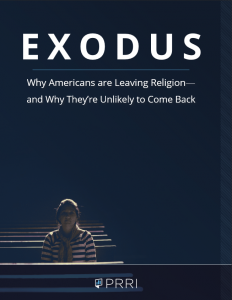PRRI Confirms What Humanists Already Knew: The Religiously Unaffiliated Are Rising

Much attention has been paid to the increasing number of Americans who identify as nonreligious. But what does their disaffiliation with religion mean and how does it affect their attitudes toward religion? A new study from the Public Religion Research Institute (PRRI) takes a look at these questions to examine just what the perspectives of nonreligious people are regarding religion, politics, and the existence of a god. Some of the findings will leave longtime activists in the humanist community shaking their heads and saying, “I could have told you that!” Other results of the study may be more surprising to humanists, and provide clues about ways we could organize these individuals and bring them into our movement.
One of the first key findings from the PRRI study upholds similar understandings from the Pew Research Center that the religious “nones” are more likely to be younger. According to PRRI, of those Americans who were raised with a particular religion but no longer identify with any religion, 62 percent left that religion before they were eighteen years old.
Many humanists would likely expect that the force driving many people, both millennials and older individuals, away from religion is their disbelief in its tenets and their disgust with many religious institutions’ bigotry toward the LGBTQ community. Those humanists would be correct! PRRI also found that the most common reason people gave for their lack of religious affiliation was a disbelief in religion’s teachings. Twenty-nine percent of individuals also mentioned their religion’s treatment of LGBTQ people as a reason for growing disillusioned with the faith.
PRRI’s report that 66 percent of unaffiliated Americans feel “religion causes more problems in society than it solves” is also understandable given people’s increasing skepticism. The same percentage of unaffiliated Americans also believe that children do not need to be brought up with religion to learn values and morals. As the trend toward religious unaffiliation continues, the humanist movement may instead see more parents reaching out to local humanist groups and other secular organizations, like Sunday Assembly, rather than churches to create community for their children.
In its study, PRRI also broke down the religiously unaffiliated into three groups: “rejectionists” (58 percent of nonreligious Americans who feel that religion does more harm than good), “apatheists” (22 percent of nonreligious Americans who feel that religion is not personally important to them but still feel it is more helpful than harmful), and “unattached believers” (18 percent of nonreligious Americans who do not identify with any religion but who say that religion is important to them personally).
Rejectionists seem more likely than the other two groups to have had unfavorable encounters with religious institutions, as 27 percent of them told researchers that their previous experience at a worship service was mostly negative. Rejectionists are also more likely than the other two groups to be younger and to have a college education. Unsurprisingly, they are also more likely to say that they don’t believe in a god. They’re also unlikely, compared to unattached believers, to think that belief in a god is necessary to live a moral life.
Given this information, the humanist movement may want to focus its efforts on the rejectionists. With their skepticism or outright disbelief in a god and in religious institutions, along with their values and morals unattached to a deity, many of them seem to already be living out humanist principles, even if they are unaware of it. However, seeing that rejectionists only make up a portion of nonreligious Americans, the humanist movement should also realize that we still have a ways to go before religiously unaffiliated Americans have truly detached themselves from the religious influences of our culture. They may not identify with any religion, but many “nones” still hold religious ideas, such as believing in a higher power or feeling that religion is a societal good. Our movement is growing with the increasing religious unaffiliation in the United States, but we must continue to make people aware that humanism is a viable, reasonable alternative to religion in order to strengthen our movement.
